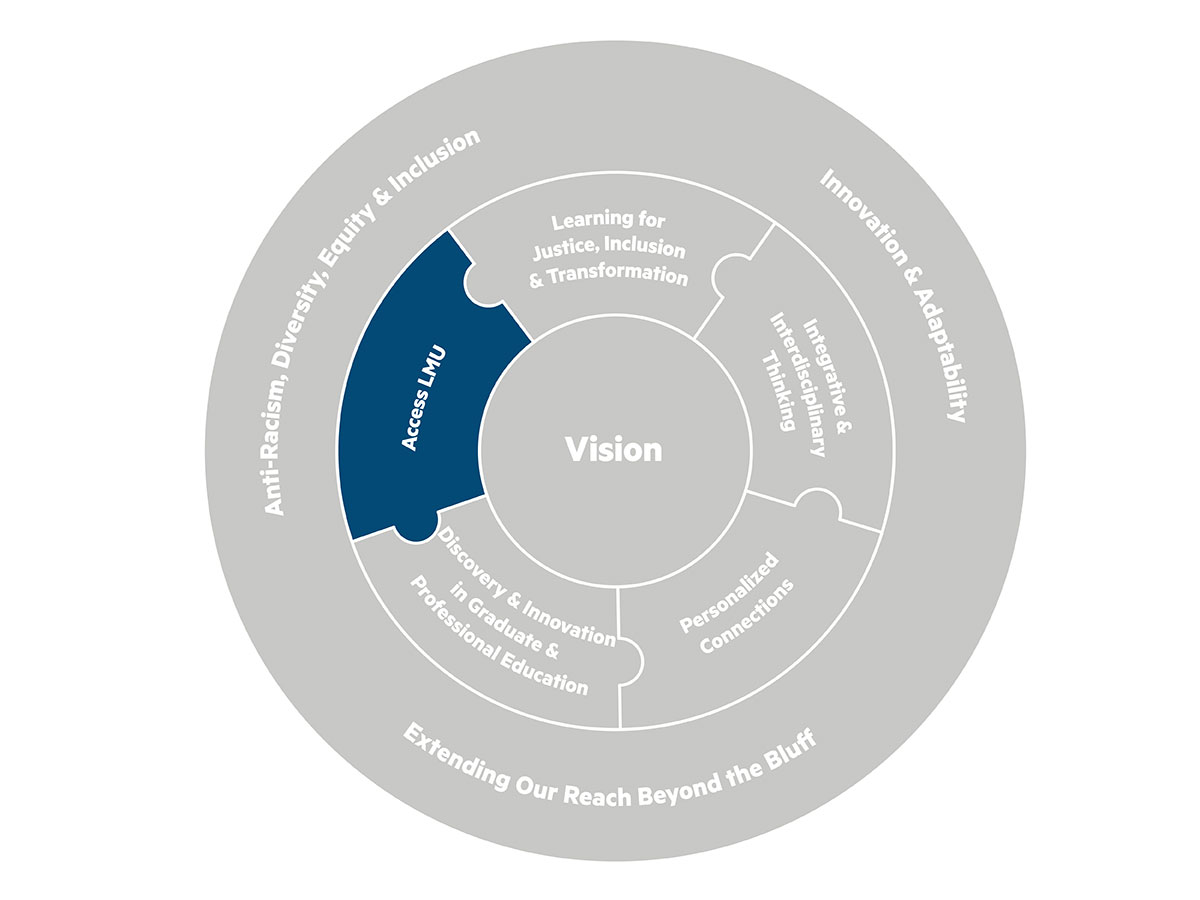Goal
Expand access to an LMU education, especially among distance learners, post-traditional students, students in non-degree or continuing education programs, and other students who have encountered obstacles to pursuing traditional forms of higher education.

Rationale and Strategic Approach
A period of disruptive change – including rising national and global inequality, an economic downturn, and increased competition among universities for high school graduates – poses a potential long-term challenge to LMU's currently strong enrollments. In the aftermath of the pandemic, we are more conscious of LMU's dependence on our on-campus and in-person learning modalities. At the same time, LMU's recent experience with transposing our student-centered higher education to remote modalities gives us the opportunity to leverage what we have learned through targeted, intentional exploration of distance learning modalities to reach new populations of learners. To address these issues, LMU should enhance fundraising for endowed and current use scholarships and devise a sustainable long-term enrollment strategy that improves access and reduces lower-income students' unmet need and dependence on loans. In addition, LMU should adapt its current modes of serving students to address the needs of several categories of students more deliberately. These include: (a) distance learners; (b) "post-traditional" students, who typically are 25 or older, seeking to complete a degree, and balancing their studies with full-time employment, dependent care, or other responsibilities; and (c) students seeking non-degree professional and continuing education. Many of these students tend to put a premium on self-paced, accelerated, evening, weekend, or other flexible learning options, and may be easier to serve through branch/satellite campuses and/or online/hybrid learning modalities. Learning to adapt to the needs of these new student populations can enable us to fulfill a commitment to improved access while expanding our sources of new enrollments beyond traditional undergraduate populations.
-
Actions
- Devise an overall enrollment and financial aid strategy aimed at balancing stable long-term enrollment patterns with improving access and reducing unmet need and dependence on loans for lower-income students.
- Through strategic fundraising initiatives, increase scholarship endowments and current use scholarship funds.
- Convene a working group to conduct a market/needs assessment and develop an action plan for serving distance learners and post-traditional students and develop an action plan.
- Explore how using prior learning assessments and other mechanisms that recognize educational achievements can facilitate appropriate academic progress for distance learners and post-traditional students and propose potential opportunities.
- Explore options for expanded online/hybrid learning, flexible learning schedules and self-paced/accelerated degree programs for distance learners and post-traditional students and outline proposals to actualize.
- Expand financial aid, advising, career center and other support services to better accommodate evening, weekend, and after-hours learning.
- Support and resource faculty who focus on adapting teaching to serve distance learners and post-traditional students.
- Research, outline, and leverage opportunities to enroll mission-appropriate cohorts of students through external partnerships, strategic acquisitions, or program mergers.
-
Actions
- Establish appropriate academic leadership structures and charge them with re-imagining, re-configuring, and re-branding LMU's continuing education offerings.
- Revise offerings of non-degree/certificate programs to ensure expansion in key professional fields, especially leveraging LMU's Playa Vista and downtown Law School campuses to take advantage of L.A.'s strengths at the nexus of the media-technology sectors.
- Develop outreach approaches that help potential non-degree-seeking learners see themselves as benefiting from an LMU education.